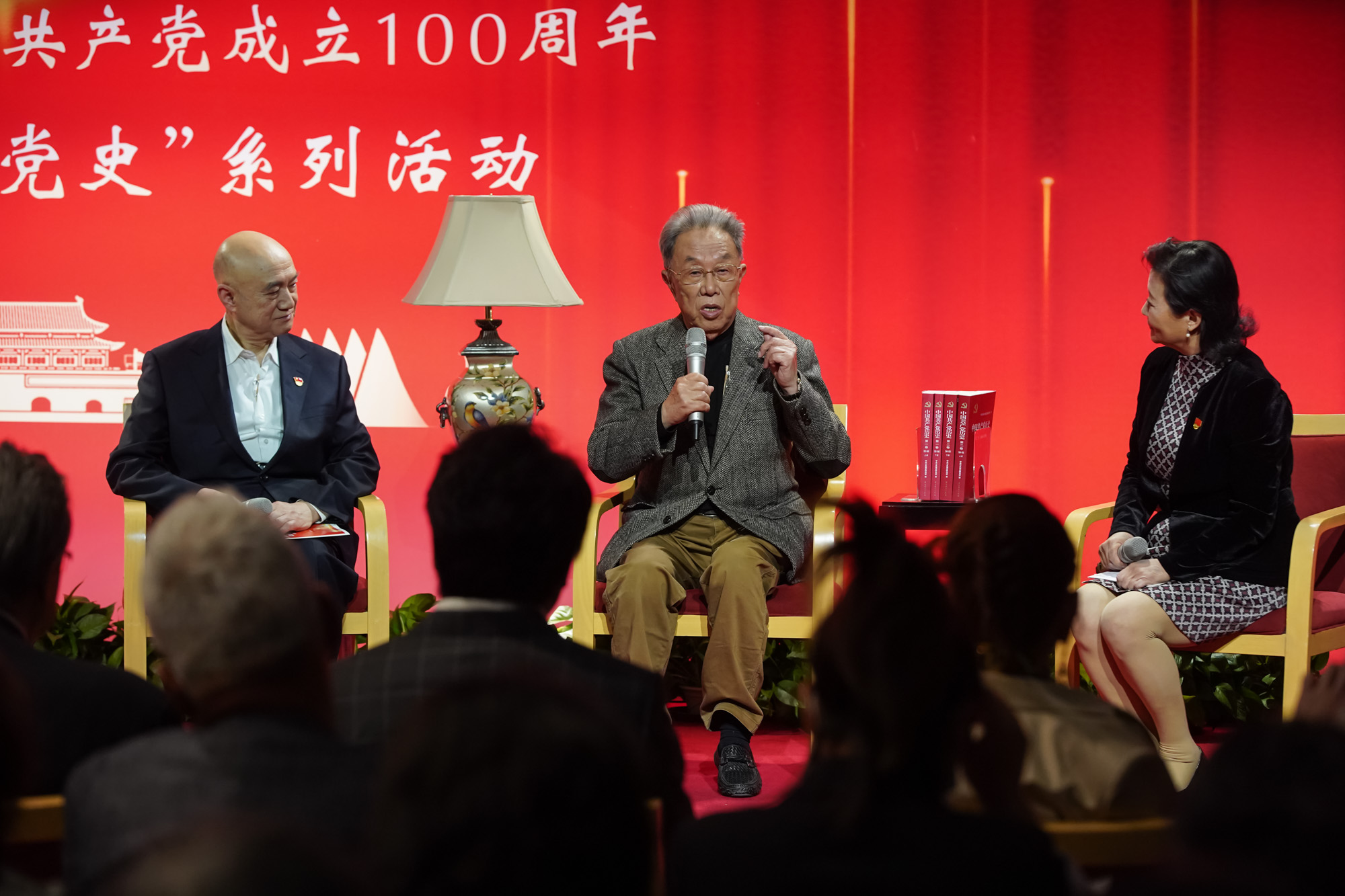In the corridor outside the door of the National Centre for the Performing Arts, transparent glass display cases are displayed in turn: "Kenchun Mud" in 1951 is China's first red record, and 1958's "Yellow River Chorus" is China's first Medium Secret Pattern Record, which has epoch-making significance... In the wash of the long river of time, these records and the literary and artistic works they carry have been precipitated into the witness of history.
On April 29, the first theme event of the series of "Party History in Literary and Art Classics" to celebrate the centenary of the founding of the Party was held at the Art Information Center of the Grand Theatre. The famous literary scholar Wang Meng talked to Shao Weizheng, an expert in party history, and told the relationship between party history and literary and artistic works, the brilliant achievements of the party's literary and artistic undertakings, and the party's spiritual genealogy.

Famous literary scholar Wang Meng (center) and party history expert Shao Weizheng (left) talk about the relationship between party history and literary and artistic works (Gao Shang photo)
In Li Guangxi's view, literary and artistic works have always been closely linked to the fate of the country. Born in 1929, Li Guangxi experienced the flames of the War of Resistance Against Japan, "when he was a child, he was a slave to the state in Tianjin for 8 years. Li Guangxi still remembers the kind of "fear" that went deep into the bone marrow, "which family's children were pulled away by the Japanese to work as laborers and never came back; people with lung disease lacked medical treatment and medicine, and almost never survived." The sense of distress for the country and the nation has cultivated our generation. Over the years, Songs such as "Ode to Yan'an" and "Songhua On the River" sung by Li Guangxi have been widely circulated, and these works are all rooted in the deep and thick feelings of home and country.
Speaking of "Ode to Yan'an", 92-year-old Li Guangxi got up from his seat and walked to the piano. He nodded to the pianist Zhang Jiajia, and the familiar melody poured out, and Lee Kwang-hee and the tenor singer Kim Jung-hyun sang indulgently. At the end of the three-minute singing, the audience applauded thunderously.
The famous singer Li Guangxi, 92, sang "Ode to Yan'an" with tenor Kim Jung-jian (Photo by Gao Shang)
"Ode to Yan'an", written by Moye and composed by Zheng Lucheng, Li Guangxi sang for more than sixty years. On Women's Day in 1955, he sang "Ode to Yan'an" for female revolutionaries such as Song Qingling, He Xiangning, and Deng Yingchao at the Beijing Hotel. "I put on my name and was just about to sing when everyone started clapping." Li Guangxi was wondering, and looked up with the audience, and it turned out that premier Zhou Enlai had come. The staff quickly brought a chair, so Premier Zhou sat about three meters away from Li Guangxi and listened to him sing the song "Ode to Yan'an".
"Friends, I've been on stage for 68 years, and it's an honor." Li Guangxi said that in addition to the recognition and love of the audience, Premier Zhou's 19-year-long promotion has also supported him to stick to the front line of the performance so far. Many people often ask him, at the age of ninety, how can he still maintain such a good state? Li Guangxi summed up 10 words: "Live every day well, and strive for some use." In his long singing career, Li Guangxi was led and led by music, and through it he understood the various states of life and the national society, "Literary and art workers are indispensable screws on the revolutionary gears, I received revolutionary education through singing, the song itself is just art, and after being given historical significance and revolutionary significance, it becomes different." It is my conscious responsibility to still be on the stage. ”
Ulantuya's story is related to "Singing Mountain Songs to the Party". The famous singer Tsetan Dolma sang "Sing a Mountain Song to the Party", which surprised and moved Ulantuya when he was a child, unlike the Mongolians living on the grassland, Tsetan Dolma's singing voice with the unique openness of the snowy plateau, but the love for the party was never limited to the nation or region. Ulantuya sang this song that had a profound impact on himself, "In Mongolian, Ulantuya means 'red light'. We were born in New China and grew up under the red flag. ”
Mongolian singer Ulantuya sings "Sing a Mountain Song to the Party" (Gao Shang Photo)
From "Ode to Yan'an" and "Singing Mountain Songs to the Party" to Shu Nan's "Don't Forget your original heart" written in 2016, what kind of literary and artistic works can be deeply rooted in the hearts of the people and widely circulated? Wang Meng believes that literary and artistic works must "reflect the real life, be considerate and understand the joys and sorrows of the people in reality, and focus not only on the present, but also on the future."
It is reported that the National Centre for the Performing Arts celebrated the centenary of the founding of the Party "Party History in Literary and Art Classics" series of activities held for a total of 20 sessions, will invite hundreds of old, middle-aged and young artists to show 50 of the most representative classic literary and artistic works in the course of the centenary party history through interpretation of works, live performances and other means. In the future, artists such as Deng Yuhua, Tan Xiaozeng, Yin Qing, and Lei Jia will continue to meet the audience with works such as "White Haired Girl", "Sha Jiabang" and "Tianlu".
Source Beijing Daily Client Yixuan | Reporter Gao Qian
Edited by Jin Liwei
Process Editor Liu Weili